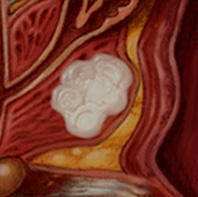
Now, the European Prospective Investigation into Cancer and Nutrition (EPIC) reports a 65% reduction in advanced prostate cancer risk among men with the highest intake of lycopene.
Lycopene is an antioxidant commonly found in tomatoes and other red- or pink-colored foods, including watermelon, papaya, rosehips, and pink grapefruit or guava.
Here’s some background on the EPC study from an article on NutraIngredients.com.
- 137,001 men (average age 60 years) from 8 European countries were followed for an average of 6 years.
- After adjusting the results to account for potentially confounding factors, the researchers reported no reduction in overall prostate cancer risk).
But?
- When they looked at only advanced prostate cancer (29% of the cases), lycopene levels were linked to a 60% reduction in advanced prostate cancer risk, compared to the lowest average levels.
The bottom line?
I’m confused. Does this mean that men who eat lots of tomatos will “only” get “mild” prostate cancer? Or, does it mean that men who eat lots of tomatos are more likely to have check-ups and catch their prostate cancer before it becomes advanced?
The debate continues.
11/30/07 20:25 JR